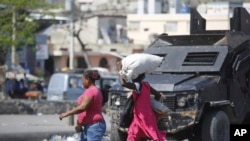U.S. Secretary of State Antony Blinken arrived Monday in Jamaica to join Caribbean leaders in discussing a solution to the political violence in Haiti and the urgent provision of humanitarian aid to its people.
The Caribbean Community, known as CARICOM, an alliance of Caribbean nations, said the talks will focus on stabilizing Haiti's security and addressing the urgent humanitarian needs.
CARICOM has been actively conversing with Haiti's stakeholders, including Prime Minister Ariel Henry, to seek a resolution.
Sunday, the U.S. military airlifted non-essential embassy personnel from Haiti and deployed additional U.S. forces to reinforce embassy security. This operation is the latest indication of Haiti's turmoil, with escalating gang violence prompting hundreds of thousands to flee their homes and threatening to bring down the government.
The State Department said the current security situation in Haiti is “unpredictable and dangerous,” and the U.S. embassy’s ability to assist U.S. citizens is “severely limited.”
The State Department’s Travel Advisory for Haiti has remained at Level Four: Do not travel to Haiti since July 2023.
“U.S. Embassy Port-au-Prince has been on Ordered Departure status since July 27, 2023. Adjustments during this time are not uncommon, nor do they represent a change in our overall posture,” a State Department spokesperson told VOA.
Security and Humanitarian Situation
Haiti declared a state of emergency March 3 following attacks by gangs on the main prisons in the capital city of Port-au-Prince. Prime Minister Henry was in Kenya at the time, finalizing a deal for a U.N.-supported peacekeeping mission aimed at addressing Haiti’s gang violence.
The gangs have demanded Henry's resignation. He is reportedly currently stranded in the U.S. territory of Puerto Rico.
Amid escalating gang violence in Port-au-Prince, the Haitian government has extended the state of emergency until April 3, and the nighttime curfew has been extended until March 11.
According to the International Organization for Migration's office in Haiti, the violence perpetrated by armed gangs has forced over 360,000 people across Haiti to flee their homes.
The U.N. Children’s Fund, or UNICEF, has warned that critical social services in Haiti are on the verge of collapse, and the humanitarian response that millions of children and civilians rely on as a last resort has been severely impaired.
Political Transition
Henry was appointed, not elected, after the assassination of President Jovenel Moise in 2021. Henry had initially promised to step down by early February but
later said security must be re-established first to conduct free and fair elections.
On February 29, CARICOM said the Haitian prime minister has committed to organizing general elections by August 31, 2025. CARICOM stated its intention to send an assessment team by March 31 of this year to evaluate electoral needs, aiming to support the planning and establishment of relevant institutions.
The United States has asked Henry to enact urgent political reform to prevent further escalation.
“As the situation on the ground grows increasingly dire, we and CARICOM have continued to call on stakeholders, including the prime minister, to make concessions in the interest of the Haitian people,” State Department spokesperson Matthew Miller said during a recent briefing.
“We are not calling on him (Ariel Henry) or pushing for him to resign, but we are urging him to expedite the transition to an empowered and inclusive governance structure that will move with urgency to help the country prepare for a multinational security support mission to address the security situation and pave the way for free and fair elections,” Miller added.
Security Mission
The United States has pledged $200 million to support the Multinational Security Support Mission in Haiti. The U.S. said the deployment of the mission will help the Haitian National Police in creating the security conditions necessary to conduct free and fair elections.
U.S. Secretary of State Blinken said last month, during an event on the sidelines of the G-20 foreign ministers’ meeting in Rio de Janeiro, that the U.S. funding would be allocated to assist the Haitian National Police “with planning, with intelligence, with airlift capacity, communications, and medical equipment and services.”
Blinken said gangs now control 80% of the capital, Port-au-Prince, and armed groups use sexual assault and rape to terrorize the population.
The new commitment builds upon a previous allocation of $189 million since July 2021 aimed at training and equipping the police force.
Additionally, the U.S. has contributed over $300 million for food, clean water, healthcare, services for survivors of gender-based violence, and other humanitarian aid during the last three years.





